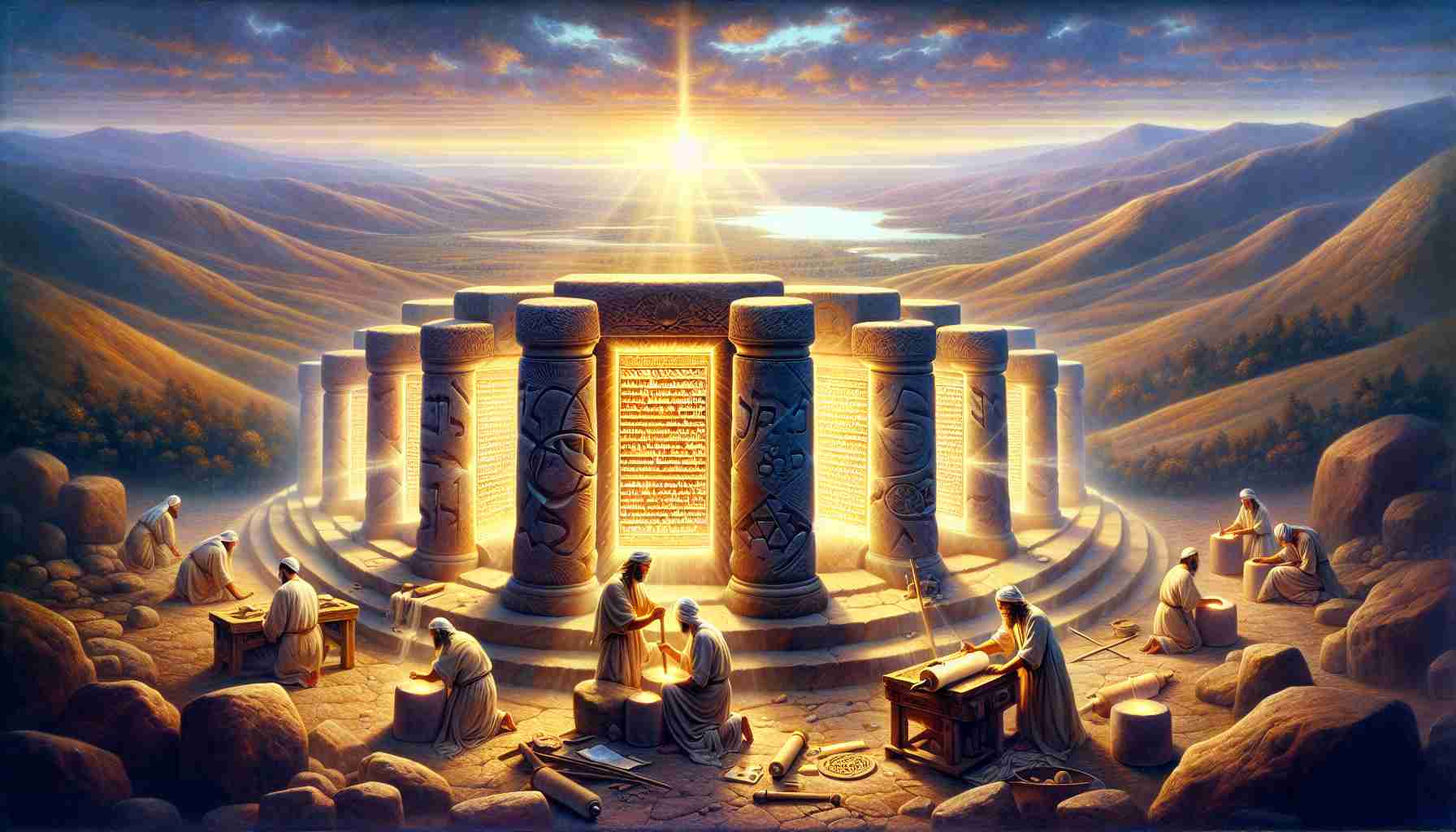

They handed me a chisel before I even knew how to write.
I was barely a man, still learning the weight of iron, yet somehow they believed I was ready. My father, a stone cutter like his father before him, placed my calloused hands on the smooth limestone and simply said, “This is no work of men. This is the covenant.”
It was near Mount Ebal, on the western side of the Jordan. We had crossed the river just days before, the whole nation of Israel pouring in like rivulets from forty years in the desert. I was born during that wandering. I never saw Egypt, only heard stories of it—of Pharaoh’s cruelty and God’s wonders. But this… this was the first time I felt what it meant to be part of something holy.
Moses had already delivered his last commands. He stood tall, though his voice carried the tiredness of a life spent carrying the burdens of others. He told us that when we entered the land, we were to write the words of the Torah—not on scrolls, not on parchment, but on stones. Twelve huge stones, coated with lime, large enough to be seen from a distance.
And so here we were.
I remember the sun beating on my back as I tried to carve the letters. I thought I knew what devotion meant, but my arms ached, sweat blurred my vision, and still, the words had to be exact. It was not just law I was etching—it was a promise between our people and the Almighty.
Simeon, one of the older workers beside me, whispered, “Every groove you make binds us to Him. Don’t rush.” His hands were slow, deliberate. He didn't need to say more.
That day, the tribes gathered. Half stood on Mount Gerizim, the other half on Mount Ebal. As Levites read aloud the blessings and curses—warnings for breaking God's law—we shouted "Amen!" again and again. The sound shook the hills.
“Amen to honoring father and mother.”
“Amen to justice for the stranger.”
“Amen to not turning from His commandments.”
Each Amen felt like a hammer striking inside my chest.
I returned to my carving with different hands after that. Not just working out of duty, but with something deeper inside me—trembling awe. We were not just settlers of the land. We were witnesses. Guardians. These stones—they weren’t monuments, they were mirrors, reflecting who we were, who we must become.
When we finished, I stepped back and stared at the tablets. My hands were dusty and raw. But something in me was healed.
Years have passed. I have children now. Sometimes, at night, I tell them the story of the stones and why the words mattered. They always ask if I was afraid to carve them.
I smile and say, “No, my child. The fear came later—when I realized what it meant to live by them.”
And in that fear, I found faith.
They handed me a chisel before I even knew how to write.
I was barely a man, still learning the weight of iron, yet somehow they believed I was ready. My father, a stone cutter like his father before him, placed my calloused hands on the smooth limestone and simply said, “This is no work of men. This is the covenant.”
It was near Mount Ebal, on the western side of the Jordan. We had crossed the river just days before, the whole nation of Israel pouring in like rivulets from forty years in the desert. I was born during that wandering. I never saw Egypt, only heard stories of it—of Pharaoh’s cruelty and God’s wonders. But this… this was the first time I felt what it meant to be part of something holy.
Moses had already delivered his last commands. He stood tall, though his voice carried the tiredness of a life spent carrying the burdens of others. He told us that when we entered the land, we were to write the words of the Torah—not on scrolls, not on parchment, but on stones. Twelve huge stones, coated with lime, large enough to be seen from a distance.
And so here we were.
I remember the sun beating on my back as I tried to carve the letters. I thought I knew what devotion meant, but my arms ached, sweat blurred my vision, and still, the words had to be exact. It was not just law I was etching—it was a promise between our people and the Almighty.
Simeon, one of the older workers beside me, whispered, “Every groove you make binds us to Him. Don’t rush.” His hands were slow, deliberate. He didn't need to say more.
That day, the tribes gathered. Half stood on Mount Gerizim, the other half on Mount Ebal. As Levites read aloud the blessings and curses—warnings for breaking God's law—we shouted "Amen!" again and again. The sound shook the hills.
“Amen to honoring father and mother.”
“Amen to justice for the stranger.”
“Amen to not turning from His commandments.”
Each Amen felt like a hammer striking inside my chest.
I returned to my carving with different hands after that. Not just working out of duty, but with something deeper inside me—trembling awe. We were not just settlers of the land. We were witnesses. Guardians. These stones—they weren’t monuments, they were mirrors, reflecting who we were, who we must become.
When we finished, I stepped back and stared at the tablets. My hands were dusty and raw. But something in me was healed.
Years have passed. I have children now. Sometimes, at night, I tell them the story of the stones and why the words mattered. They always ask if I was afraid to carve them.
I smile and say, “No, my child. The fear came later—when I realized what it meant to live by them.”
And in that fear, I found faith.